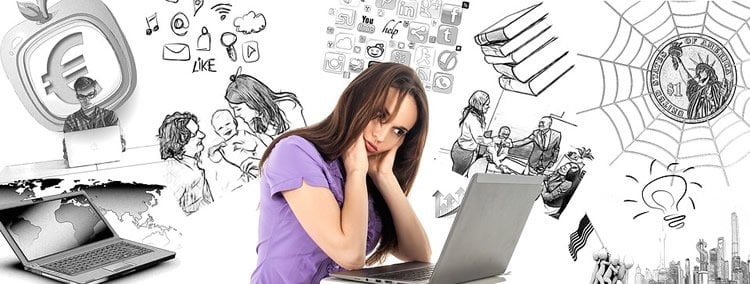Summary: Researchers say our decisions are influence by our past judgments as a way to remain self consistent.
Source: eLife.
When making decisions, our perception is influenced by judgments we have made in the past as a way of remaining consistent with ourselves, suggests new research published in eLife.
The findings provide greater understanding of human decision making generally, and pave the way for deeper investigation into how our choices are affected by our attempts to be self-consistent.
We make thousands of decisions every day based on sensory information – where to walk, who to greet and what to eat. How such perceptual decisions are formed through the integration and evaluation of sensory evidence has been studied extensively. But while previous research has suggested that the choices we make may influence our subsequent decisions, the findings have been diverse, and there is no clear model explanation that connects the various results.
To address this, two US researchers tested the hypothesis that attempting to remain self-consistent leads to post-decision biases in people when making future choices. “We expressed this hypothesis with a self-consistent Bayesian model, which assumes that a person’s perception is influenced by both their sensory evidence and their earlier choices when making a decision,” explains senior author Alan Stocker, Associate Professor at the Computational Perception and Cognition (CPC) Laboratory, University of Pennsylvania.
The scientists validated their newly developed model and its key assumptions with a set of three psychophysical experiments carried out by 10 participants (six males and four females). These experiments focused on a task sequence where the subjects first had to judge whether the overall orientation of a visual pattern (the stimulus) was clockwise or counterclockwise of a reference, before recalling the actual orientation of the pattern from memory.
The second experiment tested how the subjects’ orientation estimates were dependent on their knowledge of the stimulus in the first test, while the third experiment looked at whether they treated their judgments as if they were correct. A new set of study participants, in addition to the original 10, were recruited to perform the second and third experiments.

“Our tests validated the self-consistent model by showing that the bias pattern depended on the subjects’ prior knowledge of the stimulus, and that the subjects treated their decision as if it were absolutely correct,” says first author Long Luu, graduate student in the CPC Laboratory at the University of Pennsylvania. “Together, the results suggest that our decisions can substantially change our immediate memory of what we have just perceptually experienced in an attempt to make our experience consistent with our preceding decisions.”
Luu adds that the current model links to well-known cognitive phenomena such as confirmation bias and suggests that, in decision making generally, the brain focuses more on remaining self-consistent than on remembering precise details of the past. “This indicates that humans subconsciously condition themselves to be self-consistent in how they remember the past, and our model allows us to precisely quantify and predict these bias effects,” he says.
“Further research is now needed to understand how this self-consistency bias is reflected in the neural processes underlying our decision-making activities.”
Funding: The work was funded by National Science Foundation.
Source: Emily Packer – eLife
Publisher: Organized by NeuroscienceNews.com.
Image Source: NeuroscienceNews.com image is in the public domain.
Original Research: Open access research for “Post-decision biases reveal a self-consistency principle in perceptual inference” by Long Luu, and Alan A Stocker in eLife. Published May 22 2018.
doi:0.7554/eLife.33334
[cbtabs][cbtab title=”MLA”]eLife “Self Consistency Influences How We Make Decisions.” NeuroscienceNews. NeuroscienceNews, 23 May 2018.
<https://neurosciencenews.com/decision-making-consistency-9124/>.[/cbtab][cbtab title=”APA”]eLife (2018, May 23). Self Consistency Influences How We Make Decisions. NeuroscienceNews. Retrieved May 23, 2018 from https://neurosciencenews.com/decision-making-consistency-9124/[/cbtab][cbtab title=”Chicago”]eLife “Self Consistency Influences How We Make Decisions.” https://neurosciencenews.com/decision-making-consistency-9124/ (accessed May 23, 2018).[/cbtab][/cbtabs]
Abstract
Post-decision biases reveal a self-consistency principle in perceptual inference
Making a categorical judgment can systematically bias our subsequent perception of the world. We show that these biases are well explained by a self-consistent Bayesian observer whose perceptual inference process is causally conditioned on the preceding choice. We quantitatively validated the model and its key assumptions with a targeted set of three psychophysical experiments, focusing on a task sequence where subjects first had to make a categorical orientation judgment before estimating the actual orientation of a visual stimulus. Subjects exhibited a high degree of consistency between categorical judgment and estimate, which is difficult to reconcile with alternative models in the face of late, memory related noise. The observed bias patterns resemble the well-known changes in subjective preferences associated with cognitive dissonance, which suggests that the brain’s inference processes may be governed by a universal self-consistency constraint that avoids entertaining ‘dissonant’ interpretations of the evidence.






